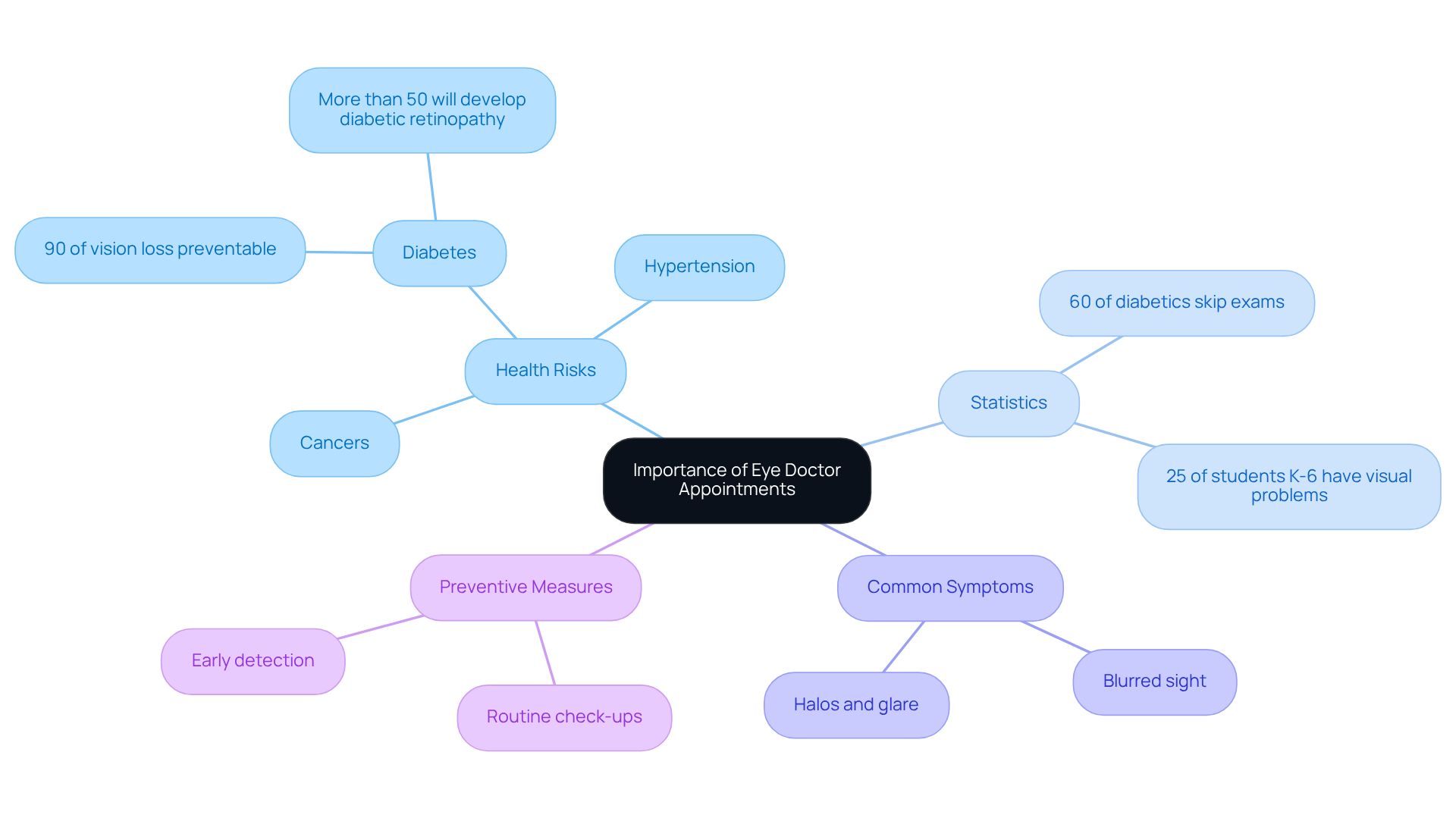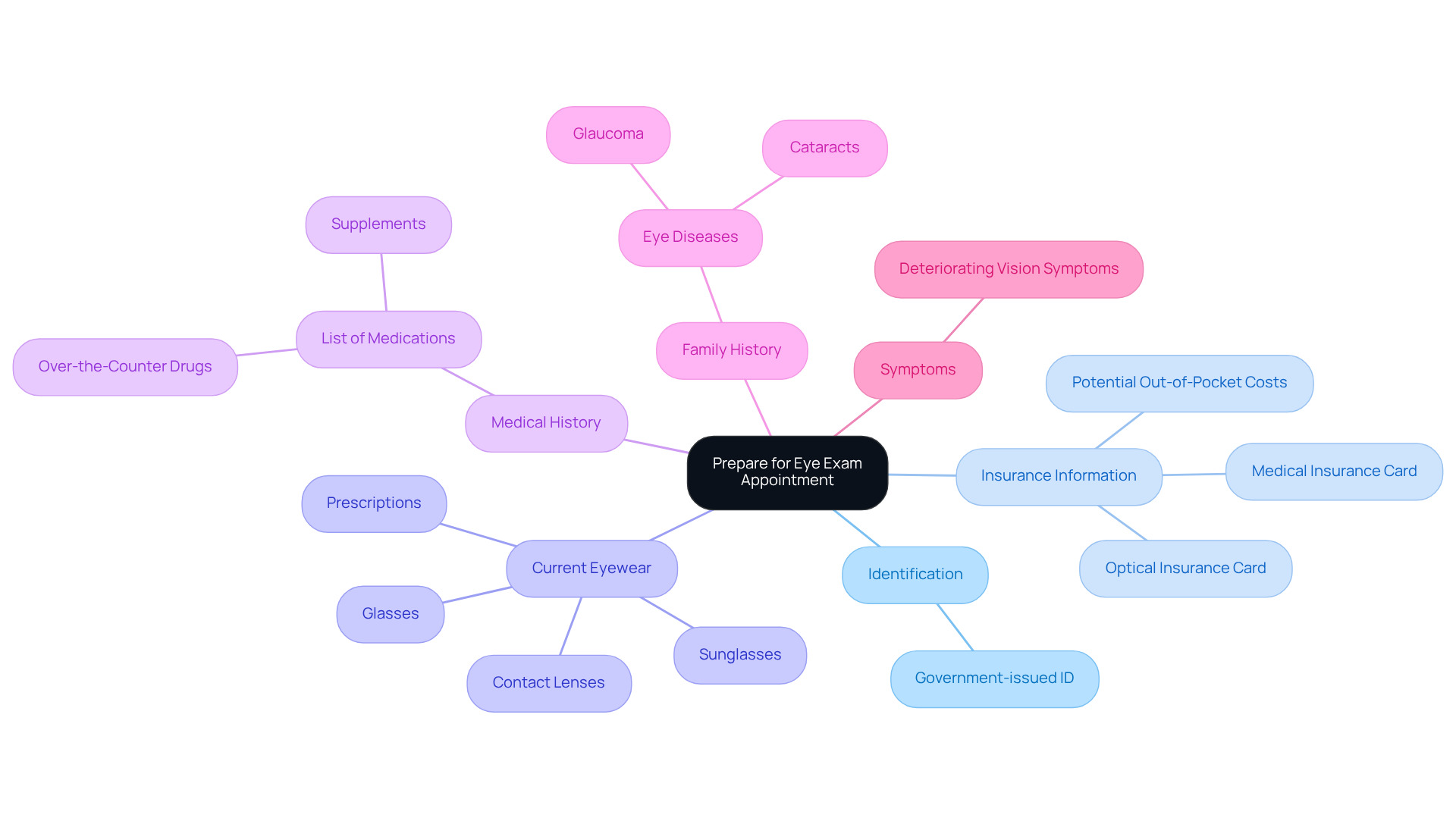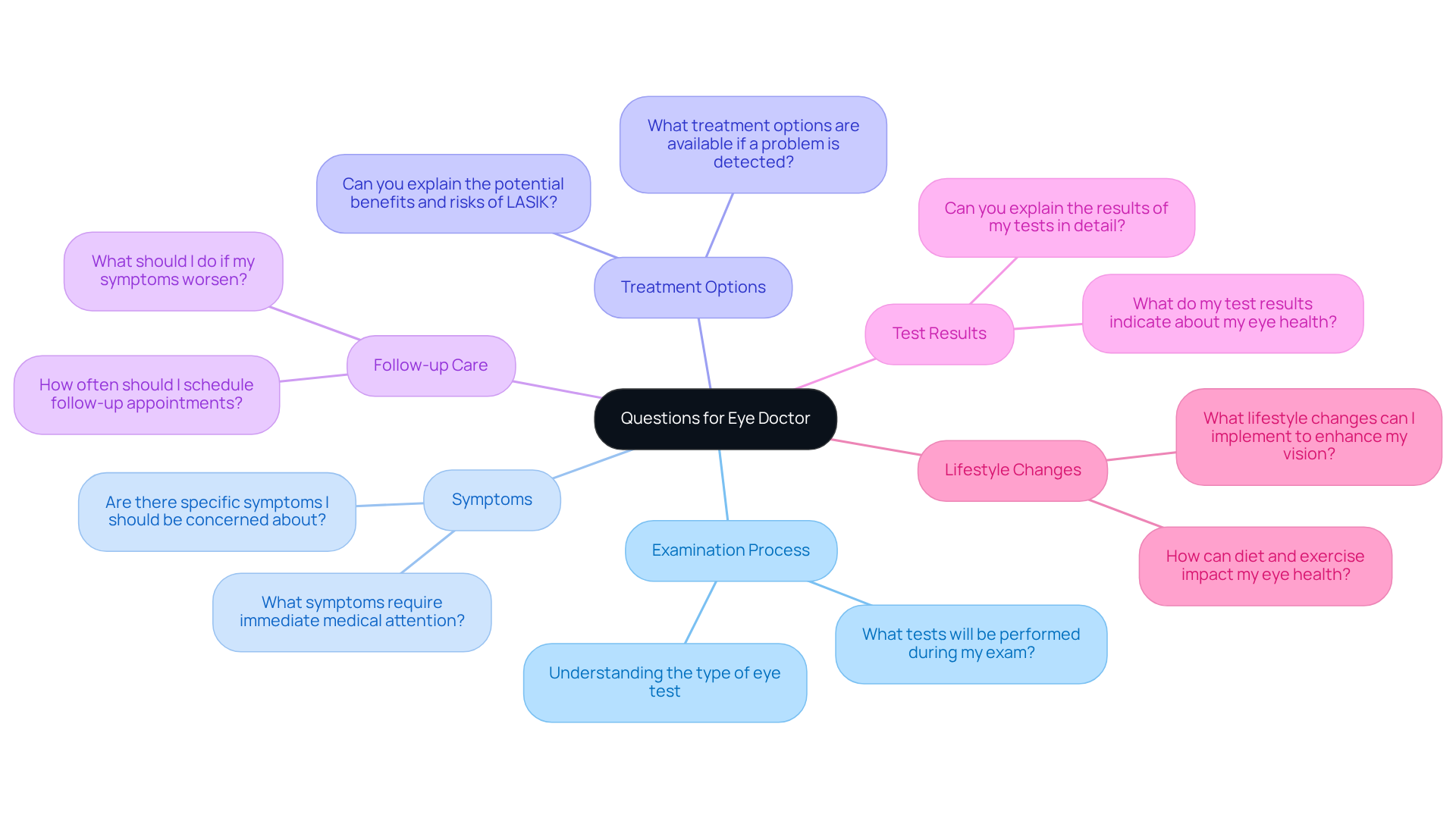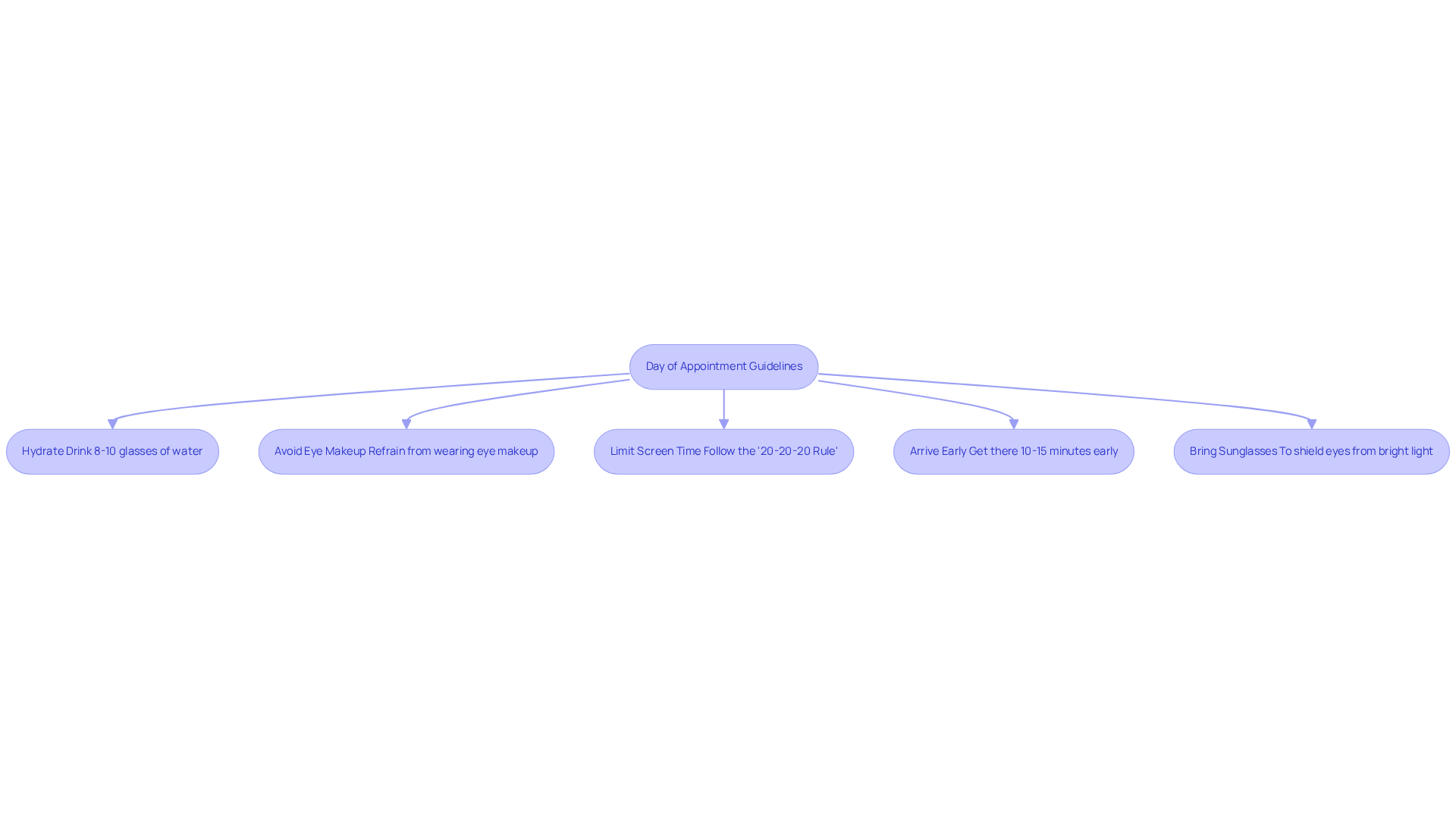Posted by: Northwest Eye in General on September 12, 2025
Overview
Preparing for your eye doctor appointment can feel overwhelming, but we are here to help you through this process. Essential steps include:
- Gathering necessary documents
- Preparing questions
- Following day-of guidelines to ensure a smooth experience
We understand that being organized and proactive not only enhances the effectiveness of your appointment but also contributes to better eye health outcomes. This proactive approach facilitates early detection of potential issues, which is crucial for your well-being.
It’s common to feel anxious about appointments, but remember that you are taking an important step towards maintaining your eye health. By preparing in advance, you can feel more confident and reassured during your visit. We encourage you to take a moment to reflect on any questions or concerns you may have; this will help you make the most of your time with your eye doctor.
Ultimately, your health is our priority, and we are here to support you every step of the way. Taking these steps will not only enhance your experience but also empower you to take charge of your eye health.
Introduction
Understanding the significance of regular eye exams goes beyond just correcting vision; it is essential for your overall health. We understand that many individuals may overlook these vital appointments, often unaware of the alarming statistics surrounding this issue. This neglect can lead to missed opportunities to safeguard your eye health and potentially prevent serious conditions.
What steps can you take to ensure a productive visit to the eye doctor? How can your preparation transform a routine check-up into a proactive health measure? It’s common to feel uncertain about what to expect, but we are here to help you through this process. By taking the time to prepare, you can make the most of your visit and feel empowered about your eye health.
Understand the Importance of Your Eye Doctor Appointment
Eye doctor appointments are essential not only for maintaining your sight but also for protecting your overall well-being. We understand that taking the time for an eye doctor appointment can feel like just another task, but these visits can uncover early signs of significant health problems, such as diabetes, hypertension, and specific cancers. In fact, more than 90% of vision loss related to diabetes can be prevented with timely detection and treatment. Alarmingly, 60% of people with diabetes fail to get their annual eye exams, highlighting the need for proactive eye care.
It’s common to feel overwhelmed by health concerns, but scheduling an eye doctor appointment to prioritize your eye health is crucial. Many eye diseases remain asymptomatic until significant damage has occurred. Conditions such as cataracts, diabetic retinopathy, and macular degeneration can lead to blurred sight, which may indicate the presence of underlying eye diseases. Symptoms such as halos—bright circles around light sources—and glare, which can disrupt your sight, are that should not be overlooked.
Routine check-ups, such as an eye doctor appointment, are vital for prevention and early intervention, enabling proactive management of potential medical concerns. Sharp sight is a duty that demands intentional attention. Incorporating an eye doctor appointment as a consistent aspect of your health regimen is an essential measure in safeguarding your eyesight and general wellness. Remember, we are here to help you through this process, ensuring that your vision remains clear and your health is prioritized.

Gather Essential Information and Documents
Before your appointment, we understand that gathering the right documents can feel overwhelming. To ensure a smooth and effective eye exam, please prepare the following essential items:
- Identification: Bring a government-issued ID, such as a driver’s license, to verify your identity. This step helps us ensure your safety and security during your visit.
- Insurance Information: Have your optical and medical insurance cards ready. This will confirm coverage for your visit, helping to minimize out-of-pocket expenses. It’s also good to be prepared for any potential costs beyond provincial and insurance coverage.
- Current Eyewear: Please bring all the eyewear you’ve been using since your last eye exam, including glasses, sunglasses, and contact lenses, along with their prescriptions. This enables your doctor to evaluate your present eyesight requirements accurately.
- Medical History: Prepare a comprehensive list of any medications you are currently taking, including over-the-counter drugs and supplements. This information is crucial, as certain medications can have side effects that affect your eyes and sight.
- Family History: Document any family history of eye diseases, such as glaucoma or cataracts. This information is vital for your eye specialist, as it helps in identifying and tracking possible eye issues, improving the overall efficiency of your eye assessment.
- Symptoms: Write down any symptoms of deteriorating vision you have experienced. This will provide your eye doctor with valuable insights to better understand your condition.
By collecting these documents and information, you will feel more prepared for your eye doctor appointment. We are here to help you through this process, ensuring that you receive the best possible care.

Prepare Questions for Your Eye Doctor
Preparing a thoughtful list of questions is essential for maximizing the value of your eye doctor appointment. We understand that this not only enhances your understanding but also fosters a collaborative relationship with your eye care provider. Consider including the following inquiries:
- What tests will be performed during my exam?
- Are there specific symptoms I should be concerned about?
- What treatment options are available if a problem is detected?
- How often should I schedule follow-up appointments?
- Can you explain the results of my tests in detail?
- What lifestyle changes can I implement to enhance my vision?
Research indicates that patients who engage actively during their appointments are more likely to achieve better health outcomes. It’s common to feel uncertain about what to ask during an eye doctor appointment, but remember that regular eye exams are crucial for early detection of conditions like glaucoma and macular degeneration, which affect millions of Americans over 40. In fact, 74% of participants reported having their eyes examined at least every two years, highlighting the importance of regular check-ups. By asking informed questions, you can better understand your eye health and the necessary steps to maintain it. This preparation not only boosts your confidence but also ensures you leave the eye doctor appointment with a clear understanding of your vision care plan, ultimately reducing the risk of serious eye conditions. We are here to help you through this process.

Follow Day-of Appointment Guidelines
On the day of your eye doctor appointment, we understand that you may have some concerns. Here are a few guidelines to enhance your eye exam experience:
- Hydrate: It’s important to drink plenty of water to keep your eyes hydrated. Proper hydration is crucial as it helps maintain the tear film, which keeps your eyes moist and comfortable during the exam. Did you know that the aqueous humor, a vital element of eye well-being, consists of 99.9% water? Strive for 8-10 glasses of water each day, adjusting for your activity level and medical circumstances. According to the Northeastern Eye Institute, drinking a glass of water before your eye doctor appointment can help you stay comfortable during your assessment and may even aid in maximizing its accuracy.
- Avoid Eye Makeup: If possible, we recommend refraining from wearing eye makeup. This helps ensure , as makeup can obscure the eye’s surface and potentially lead to misdiagnosis.
- Limit Screen Time: It’s common to feel the effects of digital eye strain. To minimize this, try to reduce your screen time before your eye doctor appointment. Following the ‘20-20-20 Rule‘ can be beneficial: take a 20-second break every 20 minutes to look at something 20 feet away. This simple practice can significantly influence your test results, as fatigue may lead to flawed evaluations.
We encourage you to arrive at least 10-15 minutes early for your eye doctor appointment. This allows you to finalize any required paperwork and unwind before your assessment, which can enhance the precision of your results. For instance, a patient who arrived early shared that they felt more at ease and concentrated during their evaluation, leading to a more thorough assessment.
- Bring Sunglasses: If your eyes will be dilated during the assessment, having sunglasses available can help shield your eyes from bright light afterward, improving your comfort as you exit the office.
By following these guidelines, you can ensure a smoother and more effective eye exam experience, ultimately contributing to better eye health. We are here to help you through this process and support you in your journey to optimal eye care.

Conclusion
Prioritizing eye health is not just about maintaining clear vision; it serves as a crucial component of overall well-being. We understand that regular eye doctor appointments can feel daunting, yet they are essential for the early detection and prevention of serious health issues, including diabetes and hypertension. By integrating these visits into your health regimen, you can take proactive steps to safeguard your eyesight and address potential concerns before they escalate.
Throughout this article, we have outlined essential steps for preparing for your eye doctor appointment:
- Gather necessary documents and medical history.
- Formulate insightful questions.
Each action contributes to a more effective and informative visit. It’s common to feel anxious, but following day-of appointment guidelines—such as staying hydrated and minimizing screen time—can enhance your experience and the accuracy of the examination.
In conclusion, taking the time to prepare for your eye doctor appointment is a vital investment in your personal health. By understanding the importance of eye exams and actively participating in the process, you can significantly improve your eye care outcomes. Embrace this opportunity to prioritize your eye health—schedule that appointment, gather your materials, and engage fully. Your vision deserves the best care possible, and the proactive steps you take today can lead to a brighter, clearer tomorrow.
Frequently Asked Questions
Why are eye doctor appointments important?
Eye doctor appointments are essential for maintaining sight and protecting overall well-being. They can uncover early signs of significant health problems, such as diabetes, hypertension, and specific cancers.
How can timely eye exams impact vision loss related to diabetes?
More than 90% of vision loss related to diabetes can be prevented with timely detection and treatment. However, 60% of people with diabetes do not get their annual eye exams, highlighting the need for proactive eye care.
What are some common eye diseases that can go unnoticed?
Common eye diseases that can remain asymptomatic until significant damage occurs include cataracts, diabetic retinopathy, and macular degeneration.
What symptoms should prompt a visit to the eye doctor?
Symptoms such as blurred sight, halos (bright circles around light sources), and glare that disrupts vision are significant signs that should not be overlooked and warrant a visit to the eye doctor.
How often should one schedule eye doctor appointments?
Routine check-ups with an eye doctor should be incorporated consistently as part of a health regimen to enable prevention and early intervention for potential medical concerns.
What is the overall message regarding eye health?
Prioritizing eye health through regular eye doctor appointments is crucial for safeguarding eyesight and general wellness, as many eye diseases can be managed effectively with early detection.






